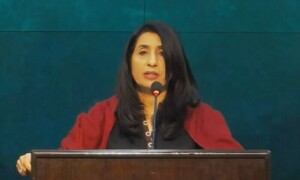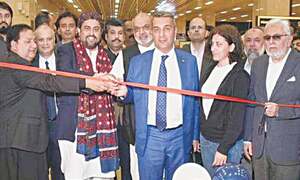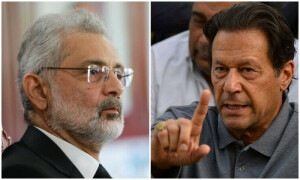IT takes less than five hours to travel by train from Shanghai to Beijing — a distance of more than 1300 kilometres — almost the same as from Karachi to Islamabad. China now has the longest network of high-speed train service in the world, running at a dizzying speed of over 300km per hour,
It is one of the major showpieces in the remarkable transformation of a country that has gone from being one of the poorest nations six decades ago to the second largest economy in the world today. China is now a superpower both in terms of the size of its economy and as a major global military force. This breathtaking progress puzzles the world.
I am on my second visit to China after a gap of more than 27 years and the country looks like a different planet. I came here for the first time in 1989 to cover the visit of the then prime minister Benazir Bhutto. By then China had already taken off on its course of economic reform that loosened state control.
Yet it still looked very much a part of the Third World trying to grapple with the political challenges that came in the wake of the opening up of the economy and consequent social changes. There were more bicycles on the streets then, unlike the luxury cars clogging the networks of expressways and flyovers now. There were few high-rise buildings that now dominate the skylines of all the big cities and towns, completely changing the landscape of the country.
China set aside its disputes with other countries in order not to deviate from its main focus on the economy.
This transformation of China from a developing country to a major global economic power has been made possible by a phenomenal economic growth rate of around 10pc over more than the past two decades. The per capita income of this country with a population of over one billion has tripled in the last 10 years. That has also helped pull more than 700 million people out of poverty. Apart from other factors, a successful population control programme has also contributed to this turnaround.
Though still ruled by the Communist Party, China has long moved away from the doctrinal socialism that formed the basis of the 1949 revolution. It has successfully experimented with a hybrid capitalist and socialist system in which private and foreign investments are equally important.
This ideology, also known as Dengism, was first developed by the late Chinese leader Deng Xiaoping in the late 1970s after the end of the so-called Cultural Revolution that left devastating effects on the country’s economy. Deng Xiaoping did not, however, reject Marxism and Mao Zedong thought but adopted a more pragmatic approach focusing on economic development.
His theory of adapting socialism to a given Chinese situation is based on his famous maxim, “It doesn’t matter whether a cat is white or black, as long as it catches mice.” What this simply means is that it does not matter whether a person is a revolutionary or not, as long as he or she is efficient and capable of doing the job under a socialist economy. Deng is rightly described as the architect of modern China.
But this second revolution led by Deng could not have been possible without the initial socialist revolution led by Mao Zedong that destroyed the old economic, political and social order and established a socialist system. That emancipated the population, thus laying the foundation of modern China.
The 1949 revolution also liberated the country from foreign occupation, giving the Chinese people self-respect and strengthening nationalism. One of its greatest contributions was in the field of education: the literacy rate increased from 20 to 80pc in less than two decades. Illiteracy has now been completely eradicated in China. That paved the ground for the second revolution.
But the Deng revolution occurred after a massive internal struggle. The Cultural Revolution was in fact an attempt by the hardliners to oust the reformists from the communist party and they had initially succeeded in doing so. Deng and some other senior leaders were sidelined. But they soon returned to take charge and lead the party on a new reformist path.
Over the past two decades, China has completely focused its energies on economic development albeit without the Communist Party’s loosening its political control, a lesson the leadership probably learnt from the collapse of the Soviet Union. That has certainly helped make the country an economic superpower. While fully protecting its sovereignty, China has refrained from being drawn into conflicts despite provocation. It set aside its disputes with other countries in order not to deviate from its main focus on the economy.
A case in point is Beijing’s relations with India with whom it has a long-running border dispute. But that has not affected Beijing’s trade relations with India which have risen to more than 100 billion dollars a year. Similarly, the Chinese leadership has remained calm in the face of the US policy of containment. Nothing seems to divert its attention from the economy.
There are some concerns about the growth rate coming down to an average of around 7pc over the past two years. But there are no serious worries. Most observers in Beijing describe the latest rate as the “new normal”. They contend that the 10pc growth rate was abnormal and that it had to settle at a rational position. However, a 7pc growth is still high compared to that achieved by most developed countries.
The slowdown of the economy may not affect China’s ambitious One Belt, One Road initiative. The proposed development strategy that focuses on connectivity and cooperation between China and other countries of Europe and Asia underlines Beijing’s push to take a bigger role in global affairs.
This development strategy remains a major challenge for President Xi Jinping who is arguably the most powerful Chinese leader since Deng Xiaoping. The biggest challenge for this new Chinese leadership is how to take the country into the next phase of economic development and reform the existing one-party rule in line with the new generation that has much greater international exposure.
The writer is an author and journalist.
Twitter: @hidhussain
Published in Dawn, June 8th, 2016













































